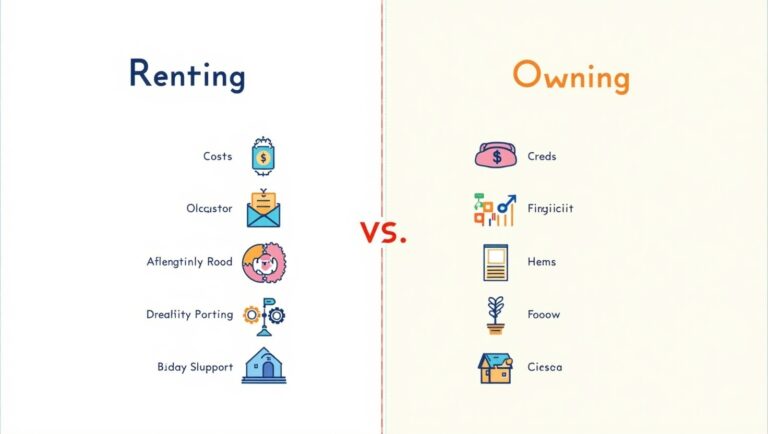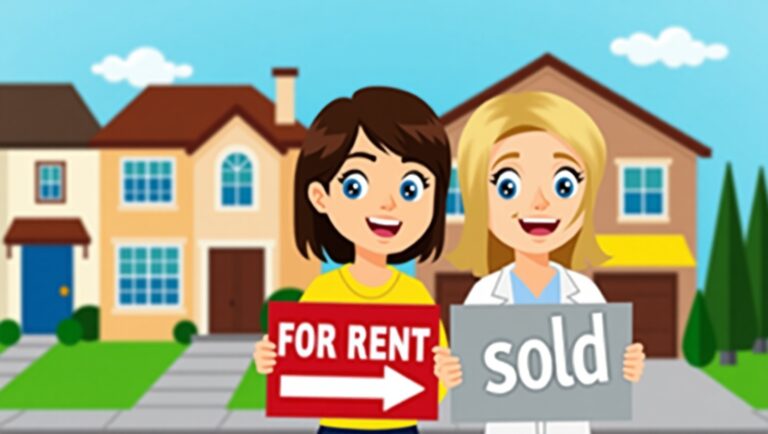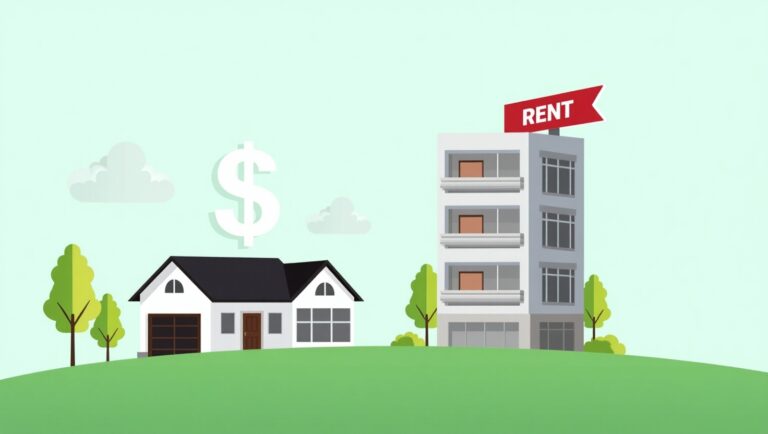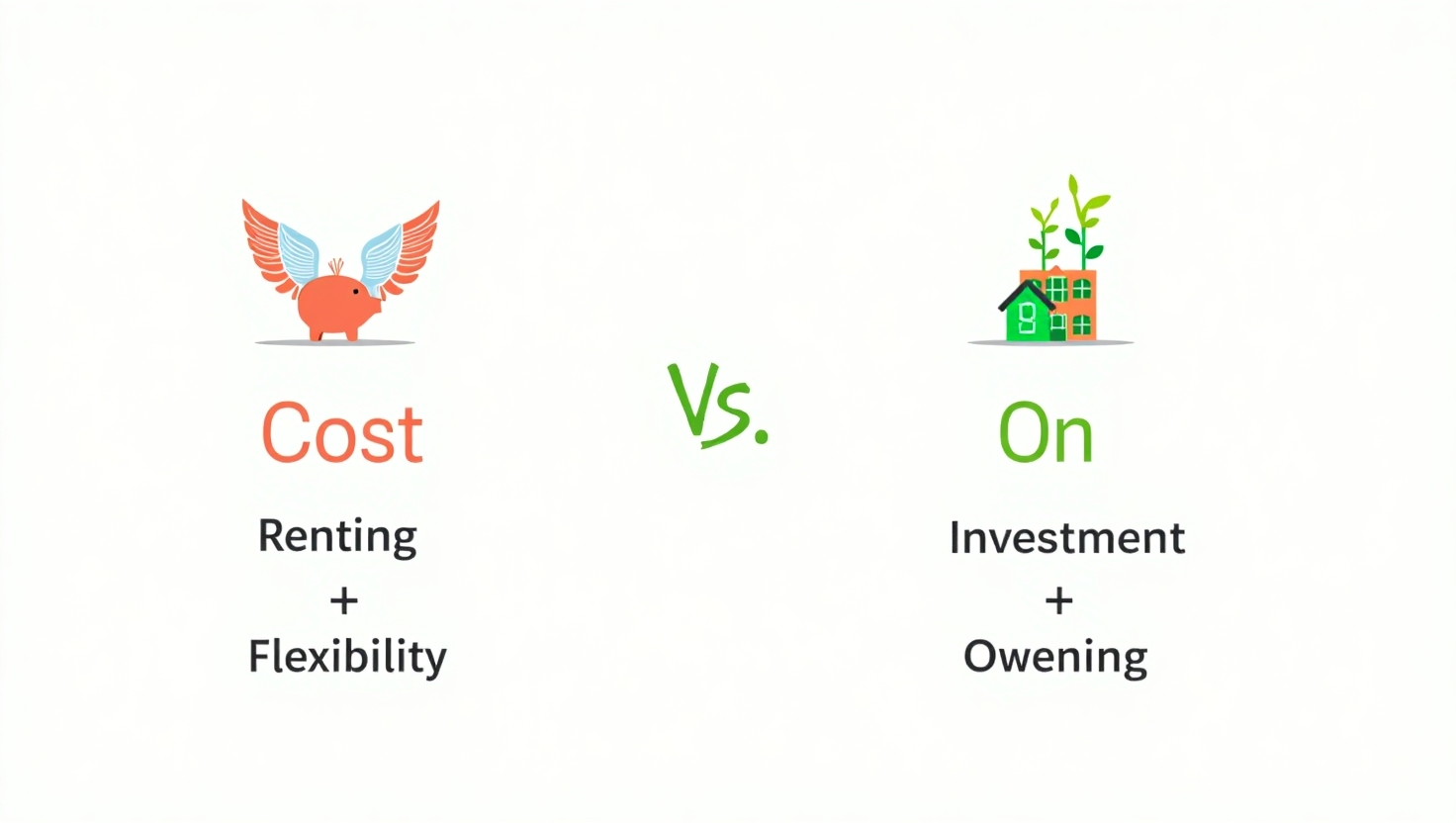Introduction
The decision between renting vs. owning a home is one of the most significant financial choices a person can make. Both options have their advantages and drawbacks, depending on your financial situation, lifestyle preferences, and long-term goals. While homeownership is often viewed as a symbol of financial stability and investment, renting offers flexibility and lower upfront costs. In this guide, we will break down the pros and cons of renting vs. owning to help you make an informed decision.

Renting vs. Owning: A Quick Comparison
Before diving into the details, let’s take a quick look at how renting and owning a home compare:
| Factors | Renting | Owning |
|---|---|---|
| Upfront Costs | Security deposit + first month’s rent | Down payment, closing costs, mortgage fees |
| Monthly Expenses | Rent payments | Mortgage, property taxes, insurance, maintenance |
| Flexibility | High – easy to move | Low – selling a home takes time |
| Equity Building | No – you don’t gain ownership | Yes – builds equity over time |
| Maintenance Responsibility | Landlord handles repairs | Homeowner is responsible |
| Customization | Limited – landlord’s rules apply | Full control to modify property |
| Financial Risk | Rent can increase but no risk of home value decline | Home value may fluctuate, affecting investment returns |

Pros of Renting a Home
-
Lower Upfront Costs
Renting requires significantly less upfront investment compared to buying. You typically need a security deposit and first month’s rent, whereas homeownership requires a substantial down payment and closing costs. -
Greater Flexibility & Mobility
If your job requires frequent relocations or you’re uncertain about settling in one place, renting offers the flexibility to move without the hassle of selling a property. -
No Maintenance or Repair Costs
Home maintenance, repairs, and property upkeep are the landlord’s responsibility, saving you from unexpected repair expenses. -
No Market Risks
As a renter, you don’t have to worry about property value fluctuations or the real estate market crashing. Your monthly rent remains your only major housing cost. -
Easier to Budget
Since rental payments are fixed in a lease agreement, you can plan your budget more efficiently without unexpected property-related costs.

Cons of Renting a Home
-
No Equity or Ownership Benefits
Unlike homeownership, where monthly payments build equity, renting provides no return on investment. -
Rent Increases Over Time
Your landlord can raise the rent at the end of your lease, making long-term financial planning more challenging. -
Limited Customization
Renters must abide by the landlord’s rules, meaning you may not be able to make modifications or renovations to your living space. -
Less Stability
Rental agreements are temporary, and landlords may choose to sell the property or not renew the lease, forcing you to relocate. -
No Tax Benefits
Homeowners benefit from mortgage interest deductions, but renters receive no tax advantages.
Pros of Owning a Home
-
Equity Building & Investment Potential
Monthly mortgage payments contribute to homeownership, building equity over time and potentially increasing wealth. -
Stable Monthly Payments (Fixed Mortgages)
Unlike rent, which can fluctuate, a fixed mortgage ensures consistent payments, making budgeting easier. -
Freedom to Customize
Homeowners can renovate, paint, and modify their property to fit their preferences. -
Tax Advantages
Mortgage interest and property tax deductions can reduce taxable income, providing financial benefits to homeowners. -
Sense of Stability & Community
Owning a home fosters a sense of belonging and permanence, as homeowners tend to stay in one place longer.

Cons of Owning a Home
-
Higher Upfront Costs
A home purchase requires a down payment (typically 10-20% of the price), closing costs, and additional expenses like property inspections. -
Maintenance and Repair Responsibilities
Unlike renting, homeowners must handle maintenance, repairs, and unexpected property-related expenses. -
Less Flexibility
Selling a home takes time, making it harder to relocate quickly if needed. -
Market Risks & Depreciation
While homes typically appreciate, economic downturns can lower property values, impacting investment returns. -
Property Taxes & Homeowners Insurance
Homeowners must pay property taxes and insurance, which can increase over time.
Key Factors to Consider Before Making a Decision
-
Financial Readiness
Evaluate your savings, credit score, and ability to handle mortgage payments, maintenance costs, and potential market downturns. -
Long-Term Goals
If you plan to stay in one place for many years, homeownership might be a better investment. However, if you value mobility, renting may be preferable. -
Local Real Estate Market
Research housing prices, rental rates, and market trends in your area before making a decision. -
Lifestyle & Career Stability
A stable job and predictable income make homeownership more viable, while uncertain career paths favor renting. -
Cost of Renting vs. Owning in Your Area
In some cities, renting is significantly cheaper than owning, making it the better option.

Conclusion: Which Option is Right for You?
Deciding between renting vs. owning a home depends on your financial situation, lifestyle preferences, and long-term goals. If you seek flexibility, lower upfront costs, and minimal responsibility, renting is a smart choice. However, if you’re financially stable and looking to build equity over time, homeownership offers long-term financial benefits. Before making a decision, evaluate your personal needs, research your local market, and consult with financial experts.
For more insights on real estate and financial planning, visit Investopedia and Zillow for up-to-date housing market trends.
By understanding the pros and cons of renting vs. owning, you can make a well-informed choice that aligns with your financial future. Let us know in the comments—are you currently renting, or do you own your home? What factors influenced your decision?
